Two years ago I was asked if I wanted to join a book tour for Open Adoption Examiner. Lori, who is amazing, is the brainchild behind these tours which go something like this: She asks a group of people to read a particular book, we read it & then submit questions based on what we have read. Lori sends us various questions to answer about the book, in turn we write a bit about the book and then submit our answers to the queries of others. The last one I participated in was for James L. Gritter's Life Givers Tour and I met many amazing folks through that en devour. This time around we were assigned Found, a memoir by best selling author Jennifer Lauck. Let me start by saying I had no idea how much this book would affect me.
Jennifer is an adoptee, twice actually, who spent a majority of her life searching for something that she could not describe. Through the book I learned that she was searching for herself along with her birth mother and her origins. Jennifer's writing is spectacular with details so clear I felt sometimes that I was in the room with her. I was in awe as to how she pulled me in and did not let go until my eyes were weary from trying to keep up. The short version: I could not put this book down.
Lauck's ambition and drive begins shortly after she leaves her somewhat family life for college, determined to be her own person in a world that could not provide answers to some of her deepest questions. Early on in the book she speaks about karma, well speaking about it does not do her justice. Jennifer dives into the definition and sets the reader up for one amazing story of karma and how it was a repeated facet of her life, even though she did not know it until much later after she finds her birth mother. I speak of this because every time Lauck finds out something about her birth family, all I could think about was the link she made to karma at the beginning of the book.
Lauck goes on to become a journalist and eventually an author. Her first memoir about her life, New York Times Bestselling Blackbird: A Childhood Lost and Found, was a great success for her. With that success came speaking engagements which ignites Jennifer to research adoption, and with her background to say she researched is an understatement.
"I tried to understand how I could contribute (she was asked to speak at an adoption event). I asked questions and conducted interviews. I discovered that none of the people who managed adoption for this group had been adopted. None of them had experienced mother-loss to any sort either.
"This seemed incredible. I would have thought that the first order of business for those who handled adoptions would be empathy garnered by direct experience. How can one know the poser of mother-loss unless they too have lost a mother?"
That powerful question leads her to Nancy Verrier whom Jennifer then works with to uncover so many different emotions and feelings left from the uncertainty of who and where she came from. At this point I was so enchanted by Lauck's tale I wanted to crawl into the book.
I will not give too much away because this book is definitely worth your time. Earlier I said that Found affected me. Boy did it. So much so that I did not turn in any questions to ask Ms Lauck. Why? I felt I had no right to ask her any questions. From my perspective as a birth mother, this book moved me beyond words. To feel Jennifer's pain was haunting. When the book reveals the moment when Lauck does meet her mother, well, I was too familiar with her mother to think that I could ask her questions. It was not a bad response, Lauck meeting her mother. It was quite the opposite. But as with all reunions, there were very difficult parts that resonated with me in a way that I never felt before. To hear it from Lauck's heart and head, to know what she was thinking during those conversations and those moments that she was with her mother was an incredibly powerful thing to read. I was touched by Lauck's honesty and compassion. I was moved to tears reading some of those words, especially this passage when she speaks to her mother for the first time on the phone:
I cleared my throat and spoke that truth.
"Thank you," I said. "Thank you for my life."
Catherine exploded like a heavy sky, tears raining, and her voice comes ragged.
"That is the most amazing thing you could have said to me," she managed. "I was just so sure you have hated me for what I did to you."
Thank you Jennifer Lauck for writing such a brilliant and compelling book about a subject that needs so much attention. I would recommend this book to all in the adoption triad, especially birth mothers and adoptees. Found will make you think, help you understand where the adoptee is coming from and hopefully make you ask some important questions of yourself no matter where you are in your adoption journey.
Here is where you can find Jennifer's book: Found
And here is where you can find more information about Jennifer.
Now, to the Book Tour for Open Adoption Examiner. Here are my responses to questions about Found.
Q: Shame figures prominently in Lauck's experience. She traces it to her mother's experience: "was I actually reliving the shame absorbed by my mother in 1963 and thus absorbed by me as the baby she carried? Was I trying to heal the both of us through my reenactment of her past?" (p. 94). Later, she writes that "No one spoke of adoptees and their silent sorrows. We were acquired, assimilated, and adapted" (p. 116). Is adoption inherently shameful, or is it only shameful because of when the process and the people involved are treated as unworthy or undeserving? Lauck's language, especially the term "acquired," suggests that adoptees have been treated as commodities rather than people. Does this resonate with you?
Kelsey's response:
Shame is ever present in adoption. I was not shamed into placing my child for adoption, rather I had wonderful support from all those around me. But that is not to say that there was still shame that surrounded it. No one was ashamed of me, not in the least. But society as a whole, especially those NOT involved with adoption, really does generate shame when a child is born and placed for adoption. The US has made great strides in adoption, but there is always room to grow and no one said it better than Ms Lauck in her book ~ (pg265) "Adoption, in an open situation, is humane." Shame should not be a part of adoption, but it is. What I want everyone to think about is what that shame will do to the adopted child. If one is ashamed of their actions or the actions of the birth family, wouldn't the adotpee feel that shame and then place it upon themselves? Not sure of the answer, but it seems a very good question to me.
To answer the other part of this question, adoption language is a very personal thing. I think people use the terms that they are comfortable with and that is just fine by me. But as far as adoptees being treated as commodities rather than people, well I don't see that side of it. After all, I gave birth to adoptees and I don't see them as commodities.
Q: On pp 17-18, Jennifer talks about a baby searching for her mother after being born. How did this sensory-rich passage strike you? What thoughts did it trigger about the role you play in adoption?
Kelsey's response:
The passage that you speak of struck me to the core. You see, when I had my daughter she was forced by the State to go into Foster Care for a month. I had every right and took those liberties to see her while she was in Foster Care. When I went to see her, as soon as I started talking to her ... everything about her changed. She recognized my voice, she would move in closer to me as I held her, she looked so intently at me that I swear she was looking right through me. This reaction amazed me, as well as my mother. I knew she knew me. I could see it in her face. And believe me, every time I had to give her back to the Foster Parents it was heartbreaking. But, I knew that she needed to know that she would be alright. That is why I went to visit her in that house considered a mutual meeting ground. In those visits, I could see her identify with me and THAT was a feeling I knew no one could take from me. It was in those quiet moments that I explained to her my love for her and my reasons for letting her go.
Q: Did the author's narrative style influence how you viewed certain eras of her life (childhood, young adulthood, the present), or did events themselves shape how you saw the story?
Kelsey's Response:
Jennifer's writing just pulled me in! I did like how she bounced back and forth from present time to past, it was a great way to see how she is now (after reunion) and how it was changing her views throughout the book. I paid so much attention in this book that the events really shaped the story for me. I learned much more than about adoption in this book. I particularly liked the way she introduced her love for Tibetan Buddhism. It was wonderful to see how that all came about, and the incredible karma that surrounded her life.
Thank you Lori for inviting me to join this tour, I love what you are doing for adoption and wish there were thousands more like you out there in the world!!
To continue to the next stop of this book tour, please visit the main list at The Open Adoption Examiner.
Jennifer is an adoptee, twice actually, who spent a majority of her life searching for something that she could not describe. Through the book I learned that she was searching for herself along with her birth mother and her origins. Jennifer's writing is spectacular with details so clear I felt sometimes that I was in the room with her. I was in awe as to how she pulled me in and did not let go until my eyes were weary from trying to keep up. The short version: I could not put this book down.
Lauck's ambition and drive begins shortly after she leaves her somewhat family life for college, determined to be her own person in a world that could not provide answers to some of her deepest questions. Early on in the book she speaks about karma, well speaking about it does not do her justice. Jennifer dives into the definition and sets the reader up for one amazing story of karma and how it was a repeated facet of her life, even though she did not know it until much later after she finds her birth mother. I speak of this because every time Lauck finds out something about her birth family, all I could think about was the link she made to karma at the beginning of the book.
Lauck goes on to become a journalist and eventually an author. Her first memoir about her life, New York Times Bestselling Blackbird: A Childhood Lost and Found, was a great success for her. With that success came speaking engagements which ignites Jennifer to research adoption, and with her background to say she researched is an understatement.
"I tried to understand how I could contribute (she was asked to speak at an adoption event). I asked questions and conducted interviews. I discovered that none of the people who managed adoption for this group had been adopted. None of them had experienced mother-loss to any sort either.
"This seemed incredible. I would have thought that the first order of business for those who handled adoptions would be empathy garnered by direct experience. How can one know the poser of mother-loss unless they too have lost a mother?"
That powerful question leads her to Nancy Verrier whom Jennifer then works with to uncover so many different emotions and feelings left from the uncertainty of who and where she came from. At this point I was so enchanted by Lauck's tale I wanted to crawl into the book.
I will not give too much away because this book is definitely worth your time. Earlier I said that Found affected me. Boy did it. So much so that I did not turn in any questions to ask Ms Lauck. Why? I felt I had no right to ask her any questions. From my perspective as a birth mother, this book moved me beyond words. To feel Jennifer's pain was haunting. When the book reveals the moment when Lauck does meet her mother, well, I was too familiar with her mother to think that I could ask her questions. It was not a bad response, Lauck meeting her mother. It was quite the opposite. But as with all reunions, there were very difficult parts that resonated with me in a way that I never felt before. To hear it from Lauck's heart and head, to know what she was thinking during those conversations and those moments that she was with her mother was an incredibly powerful thing to read. I was touched by Lauck's honesty and compassion. I was moved to tears reading some of those words, especially this passage when she speaks to her mother for the first time on the phone:
I cleared my throat and spoke that truth.
"Thank you," I said. "Thank you for my life."
Catherine exploded like a heavy sky, tears raining, and her voice comes ragged.
"That is the most amazing thing you could have said to me," she managed. "I was just so sure you have hated me for what I did to you."
Thank you Jennifer Lauck for writing such a brilliant and compelling book about a subject that needs so much attention. I would recommend this book to all in the adoption triad, especially birth mothers and adoptees. Found will make you think, help you understand where the adoptee is coming from and hopefully make you ask some important questions of yourself no matter where you are in your adoption journey.
Here is where you can find Jennifer's book: Found
And here is where you can find more information about Jennifer.
Now, to the Book Tour for Open Adoption Examiner. Here are my responses to questions about Found.
Q: Shame figures prominently in Lauck's experience. She traces it to her mother's experience: "was I actually reliving the shame absorbed by my mother in 1963 and thus absorbed by me as the baby she carried? Was I trying to heal the both of us through my reenactment of her past?" (p. 94). Later, she writes that "No one spoke of adoptees and their silent sorrows. We were acquired, assimilated, and adapted" (p. 116). Is adoption inherently shameful, or is it only shameful because of when the process and the people involved are treated as unworthy or undeserving? Lauck's language, especially the term "acquired," suggests that adoptees have been treated as commodities rather than people. Does this resonate with you?
Kelsey's response:
Shame is ever present in adoption. I was not shamed into placing my child for adoption, rather I had wonderful support from all those around me. But that is not to say that there was still shame that surrounded it. No one was ashamed of me, not in the least. But society as a whole, especially those NOT involved with adoption, really does generate shame when a child is born and placed for adoption. The US has made great strides in adoption, but there is always room to grow and no one said it better than Ms Lauck in her book ~ (pg265) "Adoption, in an open situation, is humane." Shame should not be a part of adoption, but it is. What I want everyone to think about is what that shame will do to the adopted child. If one is ashamed of their actions or the actions of the birth family, wouldn't the adotpee feel that shame and then place it upon themselves? Not sure of the answer, but it seems a very good question to me.
To answer the other part of this question, adoption language is a very personal thing. I think people use the terms that they are comfortable with and that is just fine by me. But as far as adoptees being treated as commodities rather than people, well I don't see that side of it. After all, I gave birth to adoptees and I don't see them as commodities.
Q: On pp 17-18, Jennifer talks about a baby searching for her mother after being born. How did this sensory-rich passage strike you? What thoughts did it trigger about the role you play in adoption?
Kelsey's response:
The passage that you speak of struck me to the core. You see, when I had my daughter she was forced by the State to go into Foster Care for a month. I had every right and took those liberties to see her while she was in Foster Care. When I went to see her, as soon as I started talking to her ... everything about her changed. She recognized my voice, she would move in closer to me as I held her, she looked so intently at me that I swear she was looking right through me. This reaction amazed me, as well as my mother. I knew she knew me. I could see it in her face. And believe me, every time I had to give her back to the Foster Parents it was heartbreaking. But, I knew that she needed to know that she would be alright. That is why I went to visit her in that house considered a mutual meeting ground. In those visits, I could see her identify with me and THAT was a feeling I knew no one could take from me. It was in those quiet moments that I explained to her my love for her and my reasons for letting her go.
Q: Did the author's narrative style influence how you viewed certain eras of her life (childhood, young adulthood, the present), or did events themselves shape how you saw the story?
Kelsey's Response:
Jennifer's writing just pulled me in! I did like how she bounced back and forth from present time to past, it was a great way to see how she is now (after reunion) and how it was changing her views throughout the book. I paid so much attention in this book that the events really shaped the story for me. I learned much more than about adoption in this book. I particularly liked the way she introduced her love for Tibetan Buddhism. It was wonderful to see how that all came about, and the incredible karma that surrounded her life.
Thank you Lori for inviting me to join this tour, I love what you are doing for adoption and wish there were thousands more like you out there in the world!!
To continue to the next stop of this book tour, please visit the main list at The Open Adoption Examiner.





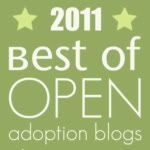

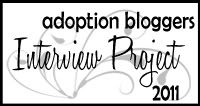













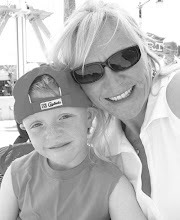






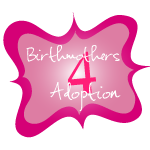
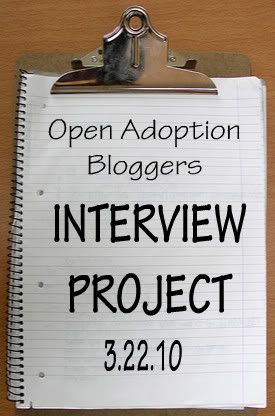



16 comments:
I'm so glad you added your voice to this discussion because I think it could be difficult for a first mom to read this book. I especially value your answers to the question about the sensory question.
I caught this, too: pg265) "Adoption, in an open situation, is humane." And I wondered if that means the author can see open adoption as an acceptable alternative when the birth parents are unable to parent and a kinship adoption isn't possible.
Thanks for your thoughts, Kelsey!
Kelsey -
I am so glad you are part of this book tour and I was *so* heartened to see you had a similar response to mine about it. Every first mother I have talked with who has read this book has felt the same way: what an incredible book. It helped on my path to healing perhaps more than any other book I have read as a first mother.
Lori - This book was completely captivating. Much like Kelsey, I could. not. put. it. down. I started reading in the afternoon when it arrived in the post and didn't stop until I had finished it. I even read it while brushing my teeth before going to bed. And just like Kelsey, I was so profoundly moved by this book I could not come up with any questions for Ms. Lauck. I am looking forward to sharing my experience of reading it when my turn comes on Monday.
Melynda
(Letters to Ms. Feverfew)
Melynda,
Thank you for telling me this! For a while there I thought I was crazy for feeling the way I did about asking questions of Ms Lauck. I know that is part of this tour and I was terribly afraid I would offend Lori or Jennifer by not submitting queries. Whew! Good to know.
I read the book twice! Then, as I told Lori privately, I had to think about it all for about three weeks and in those three weeks my mind was all over the place. Just taking in what Jennifer was writing, thinking, feeling ... well it just hit home, you know? Truly one of the most helpful points of view I have ever had the pleasure to read. It was hard, some of the things she wrote hurt. But it also helped me work through some questions I had never even considered in my journey. SO raw and poignant. Cannot recommend this book enough! Thanks for reading Letters to Ms Feverfew, I look forward to your thoughts on this book come Monday!
I am so glad to have read your thoughts on the book. I am an adoptive mother and I don't think I ever would have read the book but for this book tour and I am so glad that I did. I found the book a difficult read but an important one. I too thought about it for days and was very interested in and moved by your comments.
Thanks all for the 'must read'. Synchronicity is not unusual in the adopted life, quite common in fact.
Von, I think you would very much like this book. It is actually the sequel to her first book, Blackbird. Her voice is fantastic and the imagery that she created was top notch. Glad you read the review, I was hoping you would!
Thanks Kelsey, currently having trouble getting hold of it here on the other side of the pond, not available in Kindle and am chasing a hardcopy.
Jennifer here and your perspective has been very moving to me. You wrote: "when I had my daughter she was forced by the State to go into Foster Care for a month. I had every right and took those liberties to see her while she was in Foster Care. When I went to see her, as soon as I started talking to her ... everything about her changed. She recognized my voice, she would move in closer to me as I held her, she looked so intently at me that I swear she was looking right through me. This reaction amazed me, as well as my mother. I knew she knew me. I could see it in her face."
This is probably the most haunting thing I've ever read and I have to put my head down and just cry.
I am so very sad for the state of our world that has a mother part with her child. And in your case, an able and compassionate and present mother. I believe we will look back, one day, and see this as a very dark time in human history--when we used our thinking to do the work of the heart rather than the other way around.
They say that the worst loss a human can endure is the death of a child. I suggest that the second or perhaps equivalent loss is the loss of the original mother.
Thank you for your honesty.
I always love reading your thoughtful posts, and this one is no different. I was so touched by your answer to the question about a baby searching for her mother. Even though I feel my children connected quickly to me, I've always wondered what it was like for them not to hear the voice that they'd heard for nine months as their birth mother carried them. So glad you participated in this book tour!
Hi Kelsey!
So very happy you are part of this because I appreciate your perspective.
The push for openness is important. To be closed invites secrets and shame. I wonder, like Lori, if Jennifer meant that she views open adoption as an acceptable alternative.
Perhaps she'll let us know... :)
Judy
Wow, I can't imagine how hard it must have been for you to have to put your child in foster care for a month rather than directly into an adoptive family. Talk about inhumane to you and your child. I am humbled by your love for your child that you continued to visit her even though it likely broke your heart!
I so appreciate hearing your perspective as a birthmom.
I really enjoyed reading your perspective when it comes to this book.
Kelsey, thank you so much for sharing your perspective. Lori, you should be commended for bringing so many voices together into this conversation. I am learning so much.
I, too, was forced into state foster care for a few months while my adoption was finalized. I had long stopped thinking about my origins until the day I found a hand-written note from my guardians to my new parents: "don't feed her peaches, she gets rashy; she likes this, not that...." the not also highlighted my reactions when certain voices were in the room." Tears. Full on tears that I couldn't even help.
I am so glad you were able to spend time with your daughter and tell her things it was vital for her to hear. You know when you are loved, you just do.
Wishing you the best.
m, thank you for the beautiful words "You know when you are loved, you just do." Amazingly enough, I would have to agree with you on that point. While pregnant I used to tell my daughter every night that I loved her, I loved her so much but I was not going to be able to raise her. Believe it or not, once when she was a child she told someone that she knew her mother loved her, but she would not be able to raise her. She knew, and she still does.
Have you ever heard of Brian Stanton? He is an adoptee who wrote, produced and performed a one man show called BLANK. I ask you because he shares with his audience the moment his adoptive mother shares a letter that his birth mother wrote to him. His response, his reenactment of what he felt was astounding! Not a dry eye in the house. He tours all over the country and has a website. If you have some time and can catch his show I think you would appreciate how amazing he is.
Thanks for coming to read and I very much enjoyed your take on the book as well.
I think your post here is amazing and I really enjoyed reading about Found through your eyes. I think that's what I loved so much about this book tour. I know how I read it as an adoptee, but I love hearing about how first mothers, and adoptive parents, and people not in the "triad" read it as well. It brings a new perspective.
Great book, great tour, and great discussion!
Post a Comment